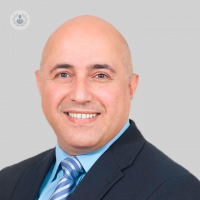The importance of prostate cancer screening
Written by:Prostate cancer is the most common form of cancer affecting men in the UK. Approximately 1 out of every 8 men will get prostate cancer in their lifetime, with the main cause being aging. If detected early, treatment can be very effective. For that reason, it is crucial that men over the age of 50 are screened regularly, to detect abnormal changes in their cell growth which could become cancerous. Highly experienced consultant urological surgeon Mr Aza Mohammed, who practises in Harpenden, Luton, London, and Hatfield, discusses the importance of regularly attending screenings with a urologist.

When should someone see a urologist about their prostate?
Prostate cancer is one of the biggest health concerns among men. Most of the cases are asymptomatic and are diagnosed when a PSA blood test is elevated. Some men might develop urinary symptoms or blood in their urine or semen. Men with a family history of either prostate or breast cancer should arrange regular prostate screenings (cancer checks) as soon as possible to rule out or diagnose prostate cancer.
It is generally accepted that if the PSA test is found to be elevated, a repeat test should be performed after a minimum of four weeks. In addition, the patient should be clear of any urinary infection and a period of up to three days of abstinence is required to ensure there is no spurious elevation of PSA.
What type of diagnostic tests do urologists perform for suspected prostate cancer?
When the patient is referred to the urologist, they will undergo two tests. The first one is a prostate MRI scan and the second one is a prostate biopsy. The MRI scan is essential to identify possible areas of abnormalities in the prostate that could be targeted with the biopsies. Prostate MRI can eliminate prostate biopsies in certain cases when the scan is completely normal, although a careful discussion with the urologist is mandatory.
How does a urologist perform a prostate biopsy?
Prostate biopsies are currently performed via the trans-perineal route and under local anaesthesia. The patient is seated in a special bed with the legs up. The perineum is infiltrated with local anaesthesia and the biopsies are taken using a special needle called the PrecisionPointTM technique.
With this technique, the patient can have the biopsies performed without the need to have a general anaesthetic. It is done with antibiotic cover to reduce the risk of infections. The patient might experience some blood in the urine and/or semen but only for a short period of time.
How often should a man see their urologist to screen for prostate cancer?
The guidelines are varied with regards to a follow up, but it is widely accepted that following a negative biopsy with PSA remaining stable, the patient can be discharged to the GP. However, if the PSA is still elevated and the MRI scan was abnormal, then the urologist can discuss repeat biopsies with the patient.
If you are interested in booking a consultation with Mr Aza Mohammed, do so directly from his Top Doctors profile.


